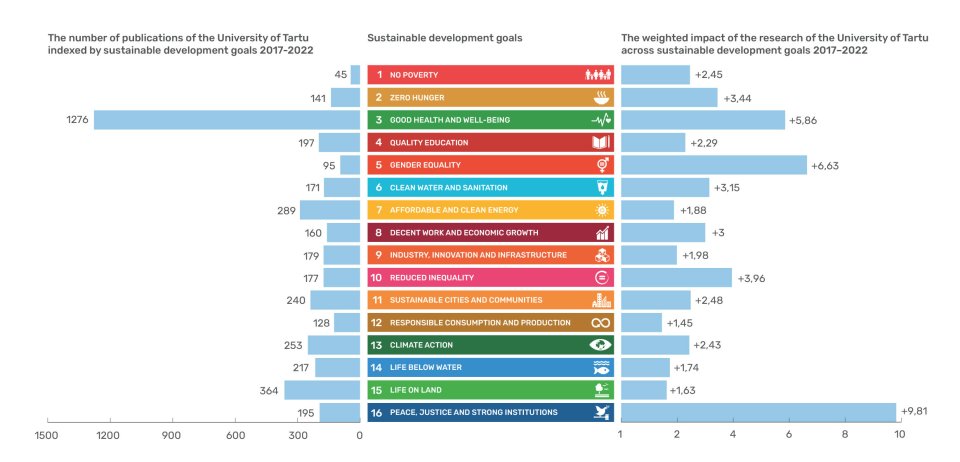Research for sustainable development
Research at the University of Tartu contributes to solving many global challenges. The figure below presents an overview of the University of Tartu’s research publications from 2017-2022 relating to Sustainable Development Goals, and describes their impact compared to the global average of relevant research. The scale on the right shows how much more influential the University of Tartu’s research is than the world average for each development goal. How can the University of Tartu lead the way to ensure that also in 2035 Estonia will be the country we want to live in? The Estonian national long-term development strategy “Estonia 2035” sets goals for the future. Researchers of the University of Tartu speak about the development needs in Estonia from the perspective of their specialisation and how the university can contribute to achieving these goals.

Science helps achieve Estonia’s long-term development goals
How can the University of Tartu lead the way to ensure that also in 2035 Estonia will be the country we want to live in? The Estonian national long-term development strategy “Estonia 2035” sets goals for the future. Researchers of the University of Tartu speak about the development needs in Estonia from the perspective of their specialisation and how the university can contribute to achieving these goals.
Flexible and lifelong learning
How to provide smart public services?
How to understand information wars?
How can family doctors use genetic information?
Science-intensive entrepreneurship
We don’t know what the world will be like in 2035. But looking at how fast the labour market is changing today, it’s clear that Estonia’s education system needs fundamental changes. The former Professor of Macroeconomics Raul Eamets and Programme Director for Educational Technology Emanuele Bardone speak about what the university is doing already now to ensure that each person could learn flexibly throughout their life.
Senior Research Fellow in Human Geography Siiri Silm and Senior Research Fellow of Sociology of Sustainability Kati Orru speak about how society could benefit from the use of mobile positioning data without compromising people’s privacy.
Senior Research Fellow in Semiotics Andreas Ventsel and Research Fellow in Semiotics Mari-Liis Madisson speak about strategic impression management – information impact activities that are systemically applied by larger social agents, such as political parties or states. Such activities aim to gain popularity among the audience and give meanings to specific topical conflicts, but also to shift the general values and identities to the direction more favourable for the manipulator.
Our daily communication involves a lot of data that we send through electronic devices. The Estonian ID-card, e-voting, online banking, various information systems and many other things we are so used to in our everyday life may all become subject to attacks. In the video, Professor in Cryptography Dominique Unruh and Professor of Information Security Raimundas Matulevičius speak about the cyber threats our researchers are trying to prevent in their work.
Almost a third of the world’s known species live in the soil and each of them has their own cause and part to play. The measures benefitting the well-being of the soil may seem to be and sometimes are quite troublesome, but become increasingly inevitable in time. In the video, Specialist in Plant Ecology Tanel Vahter speaks about why we need to know the biological state of Estonian arable soils, who live there and whether their number is sufficient.
We are living in an era of climate crisis and biodiversity loss. Due to intensive human activity, changes in the environment are now more rapid than ever. We take it for granted that we have functional substance cycles, clean water and air, soil creation, and the natural environment we need for our mental and physical health. In the video, Senior Research Fellow in Botany Aveliina Helm speaks about how our activities are endangering these benefits offered by nature.
We all want to live a long, good-quality life. UT researchers have been working hard for 20 years to help all of us extend our healthy life years. See the video to learn about how the UT researchers cooperate with Estonian general practitioners and how each of us can benefit from that.
How can the university support the development of smart society? The UT Institute of Computer Science, for instance, has continuously enhanced cooperation with companies and the public sector and created various collaboration formats for this purpose: Industrial Master’s Programme in IT, the Sandbox Programme to develop design thinking and digital product management, joint research and development project and networks. All these activities support the development of research-based society – together, we can achieve more!
The SmartEnCity project presents a great substantive challenge – reconstruction of an existing city into a smart and energy-efficient living place. To plan a smart city, one needs to know how people think and act, as well as how they move between areas. This is what the researchers at the University of Tartu are trying to find out with the help of the Institute of Baltic Studies.

